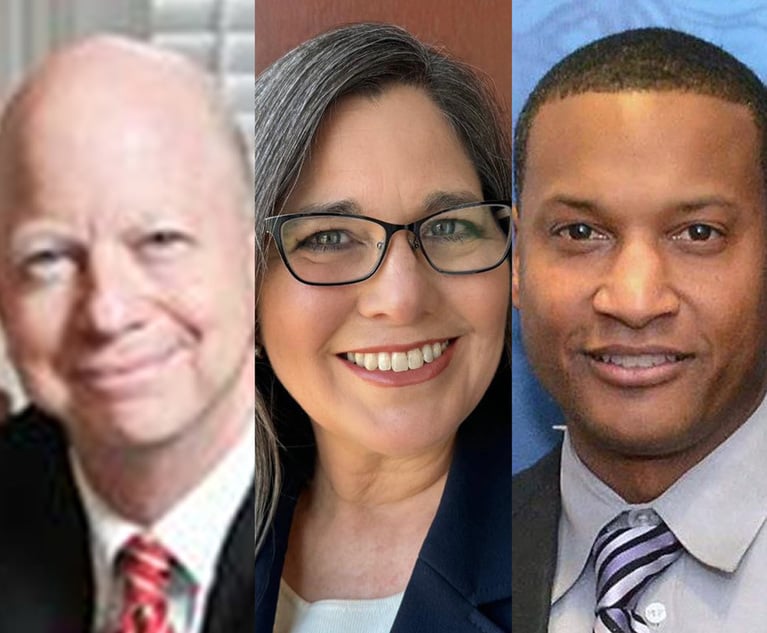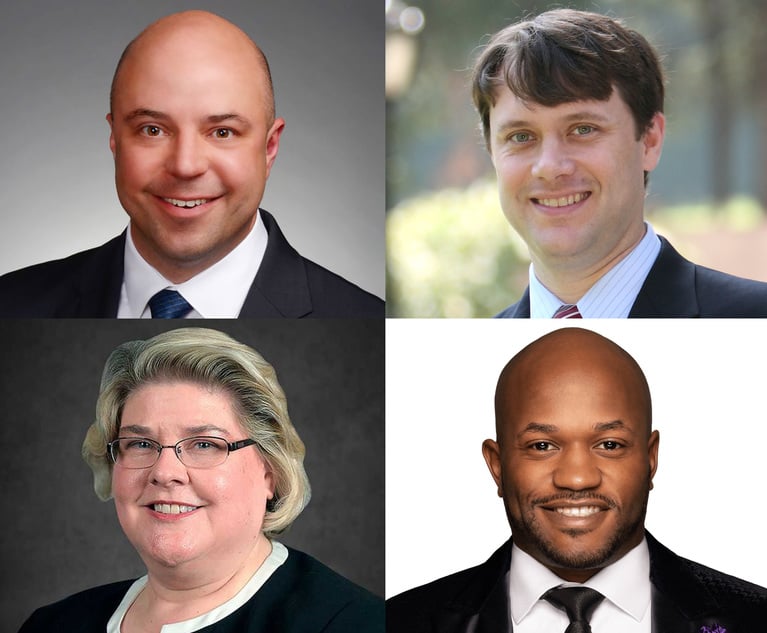 Judge Charles R. Wilson (left) and Judge Kevin Newsom), U.S. Court of Appeals for the Eleventh Circuit. (Photos: John Disney/ALM and Courtesy photo)
Judge Charles R. Wilson (left) and Judge Kevin Newsom), U.S. Court of Appeals for the Eleventh Circuit. (Photos: John Disney/ALM and Courtesy photo)11th Circuit Asked if Judges Have Inherent Power to Release Grand Jury Records
A historian was seeking records from a Georgia grand jury that investigated the deaths of four African Americans in 1946.
October 22, 2019 at 03:04 PM
5 minute read
Oral arguments about a 73-year-old unsolved lynching of four African Americans and grand jury secrecy boiled down Tuesday to a question of judicial power before the U.S. Court of Appeals for the Eleventh Circuit in Atlanta.
The case stemmed from a historian's efforts to examine records from the grand jury that investigated the deaths in 1946 at the Moore's Ford Bridge in Walton County, Georgia.
The matter has current-day significance. The U.S. Supreme Court is considering whether to hear a case from the D.C. Circuit over district court authority to release grand jury materials. That decision could spill over into a congressional attempt to obtain grand jury evidence from special counsel Robert Mueller's investigation.
The case before the Eleventh Circuit stemmed from a 2017 ruling by U.S. District Judge Marc Treadwell of the Middle District of Georgia. He ordered the release of the grand jury transcript, but the U.S. Justice Department appealed.
In February, an Eleventh Circuit panel split 2-1 to uphold Treadwell's ruling, based in part on a 1984 precedent known as Hastings, 735 F.2d 1261. The Eleventh Circuit allowed the release of grand jury records in an "exceptional situation"—the indictment of then-U.S. District Judge Alcee Hastings of Miami.
One of the two judges in the majority, Adalberto Jordan, noted he was bound by precedent but was concerned its holding over a judge's power to release grand jury records was "too open-ended."
The full Eleventh Circuit voted to hear the case and asked lawyers to address whether the court should scrap the Hastings precedent.
Bradley Hinshelwood of the Justice Department in Washington opened Tuesday's oral arguments and was soon discussing how some grand jury records are sent to the U.S. Archives. Judge Charles Wilson, who wrote the panel ruling saying the grand jury records could be released, said, "It doesn't make sense that no one can ever see them."
Hinshelwood responded that, even in those cases, the archives didn't allow classified information to be released, prompting Wilson to say a district judge could handle those issues.
Attorney Joseph Bell of New Jersey, who represents the historian's widow, ran into skepticism from several judges as he tried to defend the underlying ruling.
Judge Kevin Newsom said the U.S. Supreme Court has held a grand jury isn't part of the judiciary, so where does a judge have the authority to release grand jury materials?
"It's embodied in the Constitution and case law," Bell replied.
"The beauty of the en banc process" is that the full court can change its precedent, Newsom responded.
Judge Stanley Marcus asked why judges have authority to release grand jury materials when the grand jury is "a very distinct body" that isn't part of the judiciary or the executive branch.
Bell said judges "have a supervisory role" over grand juries.
"Why is that so?" Newsom pressed.
Wilson interrupted to help Bell answer: "Because the Supreme Court said so" in Pittsburgh Plate Glass Co. v. United States, 360 U.S. 395 (1959).
Wilson noted courts unsealed parts of famous historical cases, including those involving Julius and Ethel Rosenberg, President Richard Nixon and union leader Jimmy Hoffa.
Chief Judge Ed Carnes said no one doubts the historical importance of the grand jury records in the Moore's Ford lynching. "I'd love to have it released and read a book about it," he said, but he asserted the issue is whether courts have the authority to release the records.
Carnes cited a law signed by President Donald Trump—the Civil Rights Cold Case Records Collection Act of 2018, which allows a review board to authorize the release of records from cases like the Moore's Ford lynching.
If a judge can release grand jury records with inherent authority, Carnes asked Bell, "Why did Congress enact the act?"
Bell tried to answer but was rescued by Judge Robin Rosenbaum, who noted not all grand jury matters would be covered by the new law—using the Hastings case as an example. He was impeached and removed as a federal judge in 1989 and has served in the U.S. House since 1993.
Marcus asked Bell whether, if the court rules against him, would his client seek records under the new law?
"I hope I don't have to," Bell responded.
Related stories:
This content has been archived. It is available through our partners, LexisNexis® and Bloomberg Law.
To view this content, please continue to their sites.
Not a Lexis Subscriber?
Subscribe Now
Not a Bloomberg Law Subscriber?
Subscribe Now
NOT FOR REPRINT
© 2024 ALM Global, LLC, All Rights Reserved. Request academic re-use from www.copyright.com. All other uses, submit a request to [email protected]. For more information visit Asset & Logo Licensing.
You Might Like
View All

Who Got the Work: 16 Lawyers Appointed to BioLab Class Action Litigation
4 minute read

'Possible Harm'?: Winston & Strawn Will Appeal Unfavorable Ruling in NASCAR Antitrust Lawsuit
3 minute readTrending Stories
Who Got The Work
Michael G. Bongiorno, Andrew Scott Dulberg and Elizabeth E. Driscoll from Wilmer Cutler Pickering Hale and Dorr have stepped in to represent Symbotic Inc., an A.I.-enabled technology platform that focuses on increasing supply chain efficiency, and other defendants in a pending shareholder derivative lawsuit. The case, filed Oct. 2 in Massachusetts District Court by the Brown Law Firm on behalf of Stephen Austen, accuses certain officers and directors of misleading investors in regard to Symbotic's potential for margin growth by failing to disclose that the company was not equipped to timely deploy its systems or manage expenses through project delays. The case, assigned to U.S. District Judge Nathaniel M. Gorton, is 1:24-cv-12522, Austen v. Cohen et al.
Who Got The Work
Edmund Polubinski and Marie Killmond of Davis Polk & Wardwell have entered appearances for data platform software development company MongoDB and other defendants in a pending shareholder derivative lawsuit. The action, filed Oct. 7 in New York Southern District Court by the Brown Law Firm, accuses the company's directors and/or officers of falsely expressing confidence in the company’s restructuring of its sales incentive plan and downplaying the severity of decreases in its upfront commitments. The case is 1:24-cv-07594, Roy v. Ittycheria et al.
Who Got The Work
Amy O. Bruchs and Kurt F. Ellison of Michael Best & Friedrich have entered appearances for Epic Systems Corp. in a pending employment discrimination lawsuit. The suit was filed Sept. 7 in Wisconsin Western District Court by Levine Eisberner LLC and Siri & Glimstad on behalf of a project manager who claims that he was wrongfully terminated after applying for a religious exemption to the defendant's COVID-19 vaccine mandate. The case, assigned to U.S. Magistrate Judge Anita Marie Boor, is 3:24-cv-00630, Secker, Nathan v. Epic Systems Corporation.
Who Got The Work
David X. Sullivan, Thomas J. Finn and Gregory A. Hall from McCarter & English have entered appearances for Sunrun Installation Services in a pending civil rights lawsuit. The complaint was filed Sept. 4 in Connecticut District Court by attorney Robert M. Berke on behalf of former employee George Edward Steins, who was arrested and charged with employing an unregistered home improvement salesperson. The complaint alleges that had Sunrun informed the Connecticut Department of Consumer Protection that the plaintiff's employment had ended in 2017 and that he no longer held Sunrun's home improvement contractor license, he would not have been hit with charges, which were dismissed in May 2024. The case, assigned to U.S. District Judge Jeffrey A. Meyer, is 3:24-cv-01423, Steins v. Sunrun, Inc. et al.
Who Got The Work
Greenberg Traurig shareholder Joshua L. Raskin has entered an appearance for boohoo.com UK Ltd. in a pending patent infringement lawsuit. The suit, filed Sept. 3 in Texas Eastern District Court by Rozier Hardt McDonough on behalf of Alto Dynamics, asserts five patents related to an online shopping platform. The case, assigned to U.S. District Judge Rodney Gilstrap, is 2:24-cv-00719, Alto Dynamics, LLC v. boohoo.com UK Limited.
Featured Firms
Law Offices of Gary Martin Hays & Associates, P.C.
(470) 294-1674
Law Offices of Mark E. Salomone
(857) 444-6468
Smith & Hassler
(713) 739-1250






